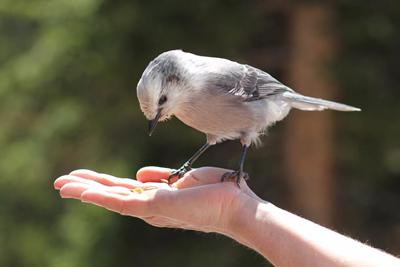Connect with nature to improve your mental health

With Mental Health Awareness Week upon us (10 - 16 May), this year’s theme of connecting with nature to benefit our mental health is something strongly advocated by Dr Neil Gostling at the University of Southampton.
As a Lecturer in Evolution and Palaeobiology, Neil is interested in all living things – past and present – and as a mental health advocate amongst his academic colleagues and students can see the benefits that communing with nature can bring to us all.
“We live lives that are totally different from the way that we’ve evolved,” says Neil. “From personal experience, I’m sitting in my bedroom which has been my office for 8.5 hours a day for over a year, sitting under an electric light – that’s not what we evolved to do and not what we should be experiencing.
“Actually getting outside can have huge benefits – it just makes us feel better,” he enthuses. “There are loads and loads of studies out there that show engaging with nature and getting outside is really good for you.”
Here are four tips from Neil to help others connect with nature in pursuit of better mental health:
1. Switch off to technology, and switch on to nature
“You need to have time away from technology – so turn your phone off as you go outside and all of a sudden you are disconnected from the rest of the world. You don’t need to send those emails right now, that could be done at any time so don’t succumb to those extra pressures.
“So, if you’re walking in the woods, and you’ve turned off your technology, you are disconnected and you’ve only got your immediate experience of your surroundings informing you as to what’s going on. It’s really rather nice just to take a step back from the world and just allow yourself to let go of the modern world and all of those extra stresses and strains.”
2. Notice and appreciate the small things nature has to offer
“For me, the thing that is most important is that nature slows you down. If you just stand and you watch a butterfly flitting around, that’s quite calming. And the closer you look at something, the more you can begin to appreciate it for its beauty as well as its place in the natural world.
“Just seeing little, tiny, weedy plants growing out of cracks in the edge of the pavement, I think about how this little plant has managed to find a foothold. It’s remarkably calming, it’s remarkably centring and you can get your little boy over, as I do, to have a chat about this insect or ‘don’t touch that fuzzy one, that’ll sting’ – even if its just five minutes and it gives you a little bit of a reset as that’s how it feels for me.”
3. Don’t go far to find nature – there is always nature around you
“You don’t need to leave a built-up area to find nature. It can be anywhere.
“Normally, we would take our students on field courses at this time of year but this year we can’t because of the pandemic. We were meant to be taking our first year students to Exmoor in Devon. Now that’s pretty isolated which is nice but we couldn’t do that so we set an alternative task and one of those things was to do biological drawings by engaging with the nature around them. Many have asked, ‘where do we find stuff, what do we do?’ but just as you walk along the street or as I do from my home, walk the 150 metres or so from my front door to the edge of Southampton Water, I found the 10 plant families that I would have needed to do the project. I also saw a dozen insects or arthropod orders so that’s more than I’d need.
“Also, getting out into nature is free and if you’re a student at the University or if you live anywhere near the University campuses you’re only 10-15 minutes away from Southampton Common and the Common’s wonderful. You can see all sorts of wildlife and plants there like little orchids there which aren’t in some sort of secluded part of the Common, they’re just there as you walk in via the top corner.
“Not only do you have the vast amount of space on the Common, you’ve got the cemetery at the bottom and cemeteries are great places for wildlife because people tend to be quiet and calm there so the wildlife there feels safer.”
4. Look up as well and down to appreciate the nature around you
“Not everyone is mobile or has ground floor access to the outside world, especially those who live in high-rise flats or other homes where there are no garden spaces where I recommend a simple solution.
“You don’t have to have a back garden to go out and appreciate the natural world. If you’re up high, you might be at eye level with sea gulls and you can see what they’re doing or you have a balcony or just a window you can put a bird feeder on and attract them to you.
“There will also be little tiny bugs, arthropods and worms crawling around in window boxes on your windowsill or on a balcony in a flat and we’re quite lucky that this is all happening at this time of year because the world is changing so much as the plants and the animals are coming back; we’ve got birds migrating and returning to the UK, we’ve got flowers and plants awakening, blossom on the trees and the leaves opening as the world comes back to life again.”
5. Use technology when you get home to share your experience with others
“I’ve said to turn your phones off when you go outside to experience nature but you might want to allow yourself to use your camera, at times, to ‘capture’ and share your experiences of nature with others.
“In early April 2020, just as the pandemic began to take firm hold in the UK, I set up a Facebook page called ‘The dinosaur in your windowsill’ to help people stay connected with nature from the safety of their own homes.
“The dinosaurs referred to in the title descendants of the ‘terrible lizards’ – the birds – who usually come to us in our gardens without us having to go and find them ourselves. Just over a year later, and the page has attracted over 4,200 followers across the world’s seven continents (including Antarctica!) with regular contributors from the United States, Australia, New Zealand and India. I just set up the Facebook page for a bit of fun but it’s proven to be a real lifesaver for many people who have used the internet to stay in touch with other people – around the world – throughout the pandemic and beyond, so do please find us, and join us, on Facebook.”
